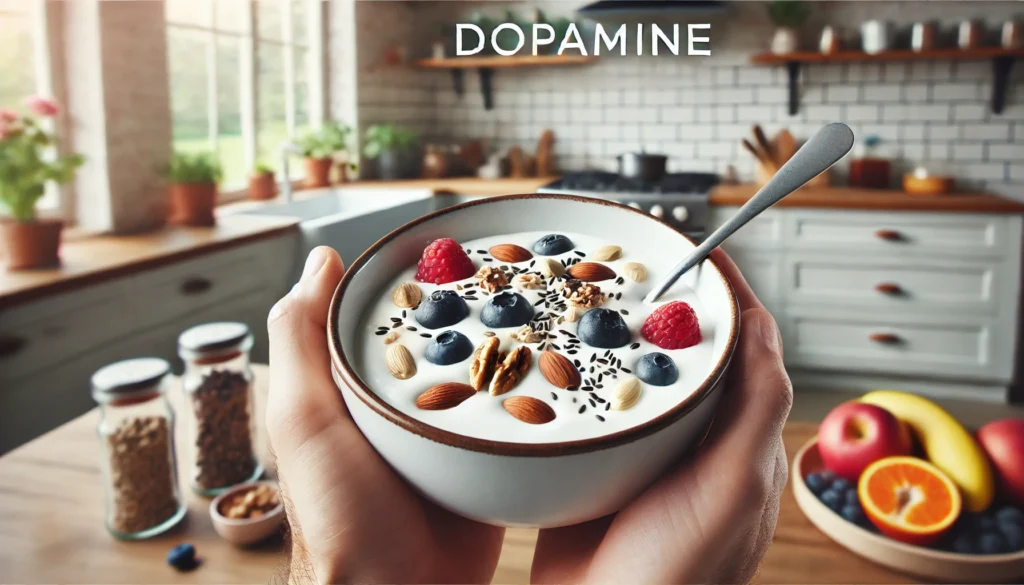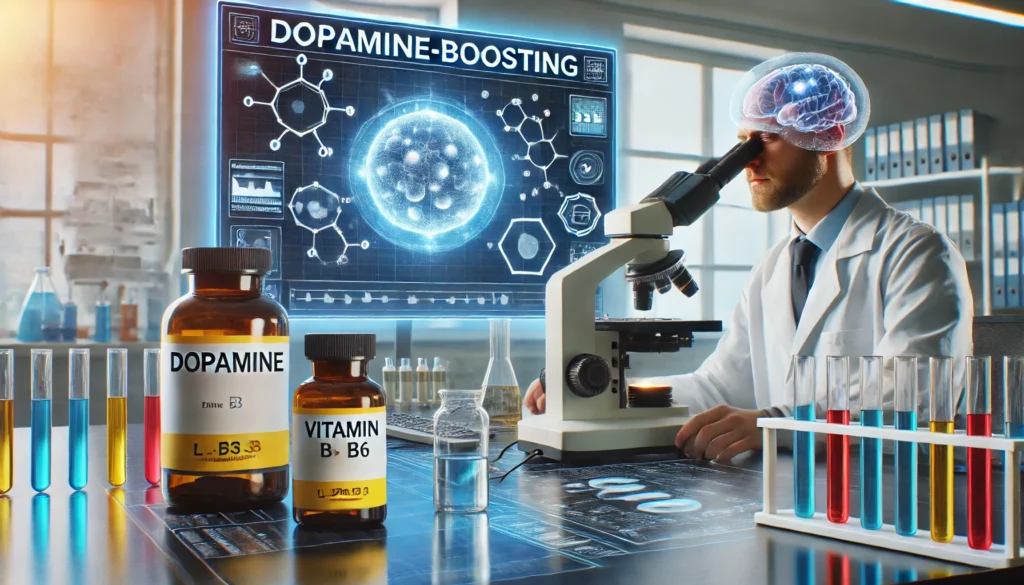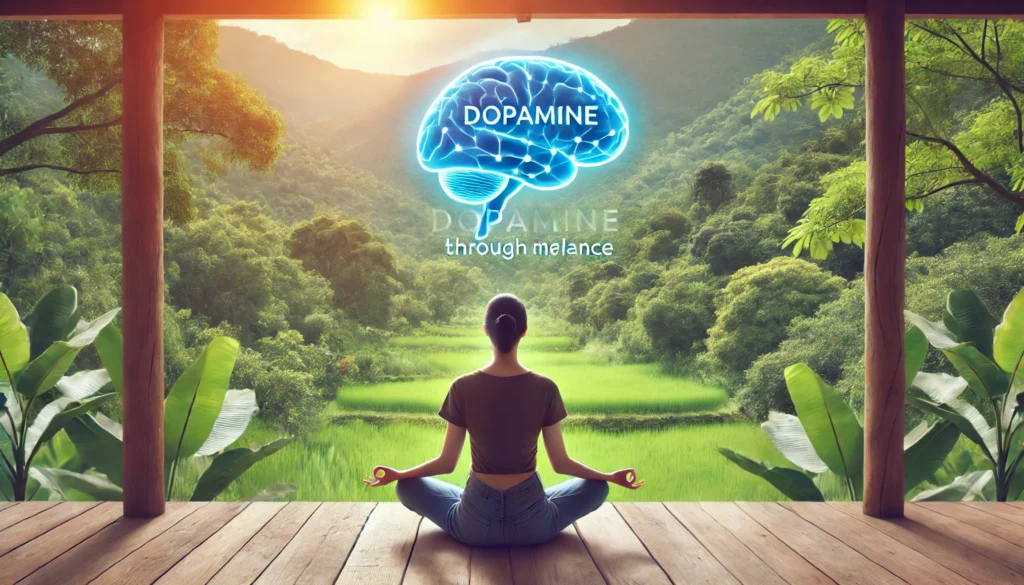In the bustling world of health and wellness, dopamine has emerged as a central player in the quest for enhanced mental performance and overall well-being. This neurotransmitter, often dubbed the “feel-good” chemical, plays a pivotal role in our mood, motivation, and cognitive functions. But how can we naturally boost our dopamine levels? This guide delves into the foods and supplements that can support dopamine production, offering insights for health coaches, science journalists, and biohackers alike.
You may also like: Top Nootropic Brands for Enhanced Focus

Understanding Dopamine: The Brain’s Motivator
Dopamine is more than just a neurotransmitter; it is integral to how we experience pleasure and reward. It is involved in regulating mood, attention, and learning. When dopamine levels are balanced, we feel motivated, focused, and content. However, deficiencies can lead to feelings of apathy, fatigue, and even depression.
The Science Behind Dopamine
Dopamine synthesis begins with the amino acid tyrosine, which is obtained from dietary sources. Tyrosine is converted into L-DOPA, which then becomes dopamine. This conversion process involves several enzymes and cofactors, making it a complex biochemical pathway influenced by nutrition, lifestyle, and genetics. Understanding this pathway allows us to appreciate the delicate balance required to maintain optimal dopamine levels.
Dopamine’s Role in Mental Health
Beyond its role in motivation and reward, dopamine is crucial for mental health. Imbalances in dopamine levels are associated with a range of psychiatric and neurological disorders, such as depression, schizophrenia, and Parkinson’s disease. Research continues to explore how optimizing dopamine levels can improve treatment outcomes and enhance mental health.
Dopamine and Cognitive Functions
Dopamine’s influence extends to cognitive functions, such as memory, attention, and problem-solving skills. It modulates neural circuits in the brain that are responsible for executive functions and decision-making. Enhancing dopamine activity can lead to improved cognitive performance, which is particularly beneficial in high-stress or demanding situations.
Natural Stacks Dopamine Brain Food: A Review
Among the plethora of supplements claiming to boost brain health, Natural Stacks Dopamine Brain Food stands out. This supplement is designed to support dopamine production using natural ingredients. But how effective is it?
Key Ingredients and Their Role
Natural Stacks Dopamine Brain Food contains a blend of essential nutrients that work synergistically to enhance dopamine levels:
- L-Phenylalanine: A precursor to tyrosine, supporting dopamine synthesis. L-Phenylalanine is an essential amino acid that must be obtained through diet or supplementation. It is crucial for maintaining a steady supply of tyrosine, which is converted into dopamine.
- Vitamin B6: Facilitates the conversion of L-DOPA to dopamine. Vitamin B6 is a vital cofactor in the enzymatic reactions that transform L-DOPA into dopamine, ensuring efficient neurotransmitter synthesis.
- Vitamin C: Protects dopamine from oxidative stress. As a potent antioxidant, Vitamin C helps to preserve dopamine by preventing its degradation through oxidative processes.
- Folate: Supports the methylation process necessary for dopamine production. Folate is involved in the methylation cycle, a critical biochemical pathway that influences neurotransmitter synthesis and overall brain health.
Natural Stacks Dopamine Food: Does It Expire?
A common question among users is whether this supplement expires. Like all supplements, Natural Stacks Dopamine Brain Food has a shelf life. It’s essential to store it in a cool, dry place and adhere to the expiration date provided on the packaging to ensure its efficacy. Over time, the potency of the active ingredients can diminish, reducing the supplement’s effectiveness.
User Experiences and Feedback
Many users report noticeable improvements in mood and focus after incorporating Natural Stacks Dopamine Brain Food into their routine. Personal experiences vary, with some individuals experiencing immediate benefits, while others notice gradual improvements over time. It’s important to remember that individual responses can depend on factors such as baseline dopamine levels and overall health.
Dopamine-Enhancing Foods
While supplements can be beneficial, a diet rich in dopamine-boosting foods is crucial. Here are some foods that naturally support dopamine production:
Protein-Rich Foods
Protein sources like lean meats, fish, eggs, and dairy products are rich in tyrosine, the building block of dopamine. Incorporating these into your diet can aid in maintaining optimal dopamine levels. Lean meats and fish provide a concentrated source of tyrosine, while eggs and dairy products offer additional nutrients that support overall brain function.
Fruits and Vegetables
Bananas, avocados, and beets are excellent sources of tyrosine. Moreover, leafy greens and cruciferous vegetables provide essential vitamins and antioxidants that protect dopamine neurons. These plant-based foods also deliver fiber and phytonutrients, supporting a healthy gut-brain axis, which is essential for neurotransmitter synthesis.
Nuts and Seeds
Almonds, walnuts, and flaxseeds are not only rich in tyrosine but also provide omega-3 fatty acids, which support overall brain health. Omega-3s are known to enhance neuronal communication and plasticity, contributing to improved cognitive function and mood stability. Regular consumption of nuts and seeds can offer a sustainable source of these vital nutrients.
Fermented Foods
Fermented foods like yogurt, kimchi, and kefir support gut health, which is linked to dopamine production. These foods contain probiotics that help maintain a balanced gut microbiome, influencing neurotransmitter synthesis and release. A healthy gut environment is crucial for optimal brain function, as it contributes to the efficient production and regulation of dopamine.
Dark Chocolate
Dark chocolate, especially varieties with high cocoa content, contains flavonoids and other compounds that can enhance dopamine levels. These compounds support blood flow to the brain and promote the release of endorphins, further enhancing mood and cognitive performance. Consuming dark chocolate in moderation can be a delicious way to boost dopamine activity.

Lifestyle Factors Affecting Dopamine
Beyond diet and supplements, various lifestyle choices can impact dopamine levels. Regular physical activity, adequate sleep, and stress management are crucial components of a dopamine-friendly lifestyle.
Exercise: A Natural Dopamine Booster
Physical activity increases dopamine receptor availability, enhancing the brain’s ability to utilize dopamine. Incorporating regular aerobic exercises, such as running or cycling, can significantly boost your mood and cognitive function. Exercise also stimulates the release of endorphins, further enhancing the “feel-good” effects associated with increased dopamine activity.
Sleep and Dopamine
Sleep is vital for dopamine regulation. A consistent sleep schedule helps maintain dopamine receptor sensitivity, reducing the risk of mood disorders and cognitive decline. Quality sleep supports the brain’s natural detoxification processes, ensuring that dopamine pathways remain clear and efficient. Prioritizing sleep hygiene can lead to improved mental clarity and emotional resilience.
Stress Management
Chronic stress depletes dopamine levels, leading to decreased motivation and focus. Mindfulness practices, such as meditation and yoga, can help manage stress and improve dopamine regulation. These practices promote relaxation and emotional balance, reducing the impact of stress on dopamine synthesis. Incorporating stress-reducing activities into daily life can enhance overall well-being.
Social Connections
Healthy social interactions can stimulate dopamine release, enhancing mood and motivation. Engaging in meaningful relationships and community activities provides emotional support and fosters a sense of belonging. Social connections are a vital component of mental health, influencing neurotransmitter balance and resilience to stress.
Creative Activities
Engaging in creative activities, such as art, music, or writing, can boost dopamine levels and enhance cognitive function. These activities stimulate the brain’s reward pathways, promoting a sense of accomplishment and satisfaction. Integrating creativity into daily life can provide an enjoyable way to support dopamine activity and mental wellness.
The Future of Dopamine Supplements
The interest in dopamine-enhancing supplements is growing, with research continuing to explore their potential benefits and applications. As science delves deeper into the complexities of brain chemistry, new formulations and approaches are likely to emerge, offering even more targeted support for those seeking cognitive enhancement.
Trends and Innovations
Emerging trends include personalized supplementation plans based on genetic profiles and the development of advanced delivery systems to enhance bioavailability and efficacy. These innovations aim to provide tailored solutions that cater to individual needs, optimizing dopamine support and cognitive performance.
Research and Development
Ongoing research is exploring the potential of novel compounds and natural extracts to support dopamine production. Scientists are investigating the efficacy of various botanicals, amino acids, and nutraceuticals in enhancing dopamine activity. This research holds promise for the development of more effective and sustainable solutions for mental health and cognitive enhancement.
Ethical Considerations
As the market for dopamine supplements grows, ethical considerations regarding their use and regulation become increasingly important. Ensuring the safety and efficacy of these products is crucial, as is promoting responsible use and informed decision-making. Collaboration between researchers, healthcare professionals, and consumers is essential to advancing the field ethically and sustainably.

Conclusion
Dopamine is a cornerstone of mental well-being and cognitive performance. By understanding the factors that influence its production and implementing dietary and lifestyle changes, you can optimize your dopamine levels naturally. Whether through the strategic use of supplements like Natural Stacks Dopamine Brain Food or by embracing a nutrient-rich diet, enhancing dopamine production can lead to improved mood, motivation, and mental clarity.
For health and wellness coaches, science journalists, and biohackers, staying informed about the latest developments in dopamine research is crucial. With the right knowledge and tools, you can support your clients, readers, or personal health journey more effectively. This understanding empowers you to make informed decisions and advocate for evidence-based practices in the pursuit of mental and cognitive health.
Remember, while dopamine is vital, balance is key. Always consult with a healthcare professional before making significant changes to your supplement regimen or diet. Individual needs and responses vary, so personalized guidance ensures that you achieve the desired benefits without compromising overall health.
Further Reading:
DOPAMINE Brain Food Review: Does This Nootropic Work?
Do Dopamine Supplements Really Work?
The Truth About Dopamine Supplements for Mood Enhancement
Important Note: The information contained in this article is for general informational purposes only, and should not be construed as health or medical advice, nor is it intended to diagnose, prevent, treat, or cure any disease or health condition. Before embarking on any diet, fitness regimen, or program of nutritional supplementation, it is advisable to consult your healthcare professional in order to determine its safety and probable efficacy in terms of your individual state of health.
Regarding Nutritional Supplements Or Other Non-Prescription Health Products: If any nutritional supplements or other non-prescription health products are mentioned in the foregoing article, any claims or statements made about them have not been evaluated by the U.S. Food and Drug Administration, and such nutritional supplements or other health products are not intended to diagnose, treat, cure, or prevent any disease.


